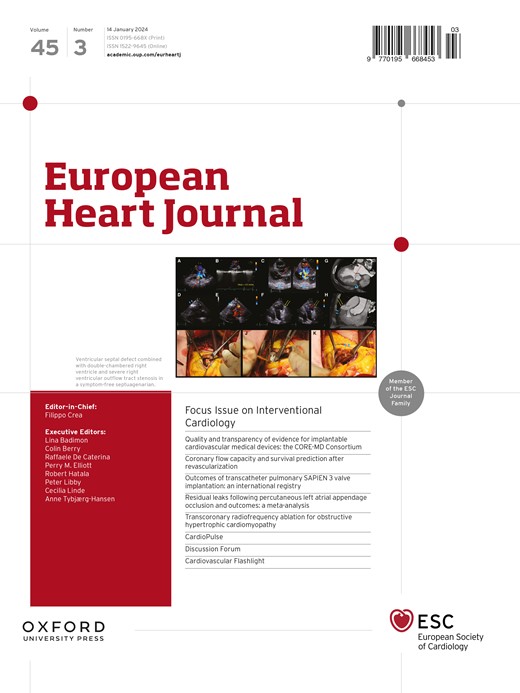DASH 与地中海饮食对血压正常或 1 级高血压成人代谢综合征和心脏代谢概况的影响:DASH-MedDiet 随机对照试验
IF 37.6
1区 医学
Q1 CARDIAC & CARDIOVASCULAR SYSTEMS
引用次数: 0
摘要
背景 生活方式干预被推荐为控制代谢综合征成分和改善心脏代谢状况的一线治疗方法。然而,目前尚缺乏直接比较 "膳食法治疗高血压"(DASH)与 "地中海饮食"(MedDiet)对代谢综合征患病率和心脏代谢风险因素影响的研究。目的 我们的目的是评估为期 3 个月的强化膳食干预,即单独或在 DASH 和 MedDiet 的基础上实施限盐,与不干预/最小干预相比,对从未接受过药物治疗、血压(BP)正常或 1 级高血压的成年人的代谢综合征患病率和心脏代谢情况的影响。方法 我们将患者随机分配到对照组(CG,n = 60)、限盐组(SRG,n = 60)、限盐 DASH 饮食组(DDG,n = 60)或限盐 MedDiet 饮食组(MDG,n = 60)。在临床营养师的协调下,所有患者每月接受一次单独随访,为期 3 个月。所有四个研究组的患者都以维持初始体重不变为目标。CG组患者接受了有关控制血压的饮食原则的一般建议。对于所有三个干预组的患者,目标是将钠的摄入量限制在每天 2,000 毫克(相当于每天 5,0 克盐)。此外,DDG 和 MDG 患者还收到了一份个性化饮食计划,其中包括六份每日样本菜单,以帮助他们采用指定的饮食模式。对干预前后的人体测量指数、饮食摄入量、办公室血压和空腹血样进行了评估。结果 根据意向治疗分析,在干预后 3 个月,与 CG 相比,DDG 和 MDG 患代谢综合征的几率比(OR)(95% CI)较低[分别为 0.29(0.12,0.72)和 0.15(0.06,0.41)]。此外,与 DDG 和 SRG 相比,MDG 的血压升高几率较低 [分别为 0.08 (0.03, 0.19) 和 0.13 (0.05, 0.34)],与 SRG 相比,MDG 的代谢综合征几率较低 [0.25 (0.09, 0.67)]。此外,与 CG 和 SRG 相比,DDG 和 MDG 的空腹血糖升高几率较低,而研究组在腰围升高、甘油三酯升高和高密度脂蛋白胆固醇降低的几率方面没有差异。在心脏代谢指数方面,与 CG 组相比,所有三个干预组的总胆固醇和低密度脂蛋白胆固醇、空腹血糖、HbA1c 和收缩压/舒张压都有所降低。结论 在限盐的背景下,MedDiet 在降低血压方面更胜一筹,但 DASH 和 MedDiet 在降低代谢综合征发病率方面的效果相同。本文章由计算机程序翻译,如有差异,请以英文原文为准。
Effect of DASH vs. Mediterranean diet on metabolic syndrome and cardiometabolic profile in adults with high normal blood pressure or grade 1 hypertension: the DASH-MedDiet randomized controlled trial
Background Lifestyle interventions are recommended as the first-line treatment to control metabolic syndrome components and improve cardiometabolic profile. However, studies directly comparing the effects of the Dietary Approaches to Stop Hypertension (DASH) vs. the Mediterranean diet (MedDiet) on metabolic syndrome prevalence and cardiometabolic risk factors are currently lacking. Purpose We aimed to assess the effects of a 3-month intensive dietary intervention implementing salt restriction either alone or on top of the DASH and MedDiet compared to no/ minimal intervention on metabolic syndrome prevalence and cardiometabolic profile in never drug-treated adults with high normal blood pressure (BP) or grade 1 hypertension. Methods We randomly assigned individuals to the control group (CG, n = 60), salt restriction group (SRG, n = 60), DASH diet with salt restriction group (DDG, n = 60), or MedDiet with salt restriction group (MDG, n = 60). All patients were followed monthly for 3 months in individual sessions coordinated by the clinical dietician. For the patients of all four study groups, the goal was to maintain the initial body weight unchanged. Patients in the CG received general advice on dietary principles for BP control. For the patients in all three intervention groups, the goal was to limit sodium intake to 2,000 mg/ day (equivalent to 5,0g salt/ day). In addition, patients in the DDG and the MDG received an individualized dietary plan with six daily sample menus to facilitate the adoption of the assigned dietary pattern. Anthropometric indices, dietary intake, office BP, and fasting blood samples were evaluated pre- and post-intervention. Results According to the intention-to-treat analysis, at 3 months post-intervention, the DDG and the MDG had lower odds ratio (OR) (95% CI) of metabolic syndrome [0.29 (0.12, 0.72), and 0.15 (0.06, 0.41), respectively] compared to the CG. Moreover, the MDG had lower odds of elevated BP levels compared to both the DDG and the SRG [0.08 (0.03, 0.19), and 0.13 (0.05, 0.34), respectively], and lower odds of metabolic syndrome compared to the SRG [0.25 (0.09, 0.67)]. In addition, the DDG and the MDG had lower odds of elevated fasting glucose compared to both the CG and the SRG, whereas the study groups did not differ regarding the odds of elevated waist circumference, elevated triglycerides, and reduced HDL- cholesterol. Regarding cardiometabolic indices, total and LDL-cholesterol, fasting glucose, HbA1c, and systolic/ diastolic BP were reduced in all three intervention groups compared to the CG. Conclusions On a background of salt restriction, the MedDiet was superior in BP reduction, but the DASH and MedDiet reduced the prevalence of metabolic syndrome to the same extent.
求助全文
通过发布文献求助,成功后即可免费获取论文全文。
去求助
来源期刊

European Heart Journal
医学-心血管系统
CiteScore
39.30
自引率
6.90%
发文量
3942
审稿时长
1 months
期刊介绍:
The European Heart Journal is a renowned international journal that focuses on cardiovascular medicine. It is published weekly and is the official journal of the European Society of Cardiology. This peer-reviewed journal is committed to publishing high-quality clinical and scientific material pertaining to all aspects of cardiovascular medicine. It covers a diverse range of topics including research findings, technical evaluations, and reviews. Moreover, the journal serves as a platform for the exchange of information and discussions on various aspects of cardiovascular medicine, including educational matters.
In addition to original papers on cardiovascular medicine and surgery, the European Heart Journal also presents reviews, clinical perspectives, ESC Guidelines, and editorial articles that highlight recent advancements in cardiology. Additionally, the journal actively encourages readers to share their thoughts and opinions through correspondence.
 求助内容:
求助内容: 应助结果提醒方式:
应助结果提醒方式:


